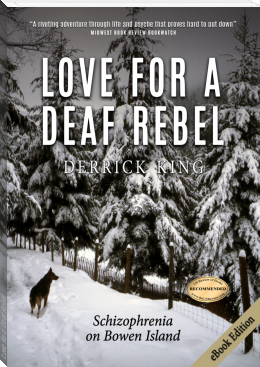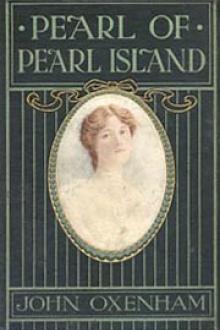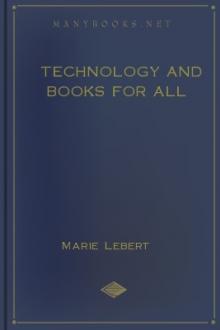Love for a Deaf Rebel, Derrick King [funny books to read .txt] 📗

- Author: Derrick King
- Performer: -
Book online «Love for a Deaf Rebel, Derrick King [funny books to read .txt] 📗». Author Derrick King
Pearl tapped my leg and signed, “Pee.” I saw a café and pulled over. She handed me her helmet and walked inside. When she walked out a few minutes later, a woman’s head peered out the door behind her. A man’s head poked out above it, followed by a child’s head below it. Three heads, stacked like a totem pole, stared.
Pearl was angry. “Stupid! I looked for a baño sign. Nothing, so I went like this.” Pearl squatted and pointed to her crotch. “They stared, so I did this.” She pointed to her buttocks and bent forward. “They stared more. So I did this.” Pearl pantomimed pulling down her pants. “I must pee now!”
I refueled so Pearl could use a gas station toilet. She ran back retching and crying. “I will have nightmares!”
She guarded the bike while I went to the toilet. The bowl was filled with yellow worms squirming in stinking brown feces.
Light traffic in the rural areas made riding pleasant, and every night we talked about the sights we had seen. Four days later, we arrived in Tapachula, near the Guatemala border. At dinner in the café, the wireless motorcycle alarm sounded. I went outside to investigate.
I signed, “A man was wiping the motorcycle with a rag. He wanted to earn some money, but he triggered the alarm. I told him to stop.”
“He was testing the alarm.”
“That is impossible because he didn’t know it had an alarm.”
“Then he was testing to see if it had an alarm.”
In the morning, we arrived at the frontier, completed the formalities, and rode into Guatemala. Guatemala was exquisite—green, mountainous, misty, and cool. Peasants walked along the shoulder wearing brightly colored serapes. We stopped at Quetzaltenango, at 2,300 meters, and checked in to the Pension Bonifaz, the best hotel in town.
“Here, with your black hair and brown eyes, you look Spanish. You are not nervous anymore.”
Pearl smiled. “We can invent a new sign for Guatemala without ‘nervous’ in it. When are you going to take photos? I want to show my friends.”
“I have a thousand photos I never look at. You can’t capture life with a camera.”
“When did you stop taking photos?”
I thought a moment. “After Eugénie left me.”
“You don’t take photos because you think I will leave someday.”
“Show me how to use your camera. Mine was stolen from my car.”
“A Minox is not automatic. It is difficult to use.”
“Eugénie used it on the nude beach.”
“Eugénie read the instruction manual.”
We walked around the cobblestoned streets, where I took a photo for Pearl. I bought machetes for my brother and me. We ate dinner on starched white linen in the hotel’s dining room, our most elegant meal of the trip.
“Order anything.”
“I can’t read the menu, so I’ll point to the most expensive item.”
The next day, it was pouring rain. We put on all our clothing and rain gear. The winding road stopped at a crumpled mass of girders lying in a river. The wreckage was guarded by soldiers, and a checkpoint preceded the detour. We handed our passports to the officer.
“You may proceed,” he said in perfect English.
We rode down a track. Pearl dismounted and forded the river, balancing with outstretched arms. Water poured into her boots. On the other side, she sat on a rock and poured the water out of her boots. I forded the river cautiously. Vapor hissed from the engine as water splashed onto it. At mid-stream, the mufflers submerged, and gurgles replaced the exhaust beat. When I reached Pearl, I remained seated with my soaking wet feet on the ground. I raced the engine to dry it.
“What happened to the bridge?” Pearl signed, wringing water from her socks.
“The rebels blew it up.”
“Why does the army guard the bridge after it’s gone?”
“Maybe soldiers were guarding it, but the rebels blew them up, too.”
We continued to Lake Atitlan, shivering in the drizzle, and stopped at the viewpoint at the edge of the volcanic caldera. “Here, we turn around. This view is famous, but all we see is fog.”
“No photo?”
“Of what—clouds?”
I regret not having taken more photos, but we were living in the moment; to have taken out a camera would have cast the shadow of the future. This I could not explain to Pearl.
We continued to Huehuetenango. We peeled off our riding gear under the yellow light of a bulb dangling from the motel ceiling, and showered in cold water. The lights went out.
Pearl lit the candles that were provided in the room.
“My panties turned blue from the jeans’ dye. I felt like I was sitting on a wet diaper.”
“My toes turned brown from the boots. No heat tonight means we will wear wet clothes tomorrow.”
We walked around the gloomy town in our rain gear. We soon returned to the motel café. A generator hummed.
I translated the menu. “Red stew with gray sauce or gray stew with red sauce, and everything with tortillas. Did you notice we haven’t gone over any bridge in Guatemala? All of them are blown up.”
We returned to Mexico; we had salud, dinero, y amor, but never enough tiempo. In Campeche, the shadows of the mountains fooled us, and twilight fell before we could reach a city. We rode slowly, avoiding potholes, children selling armadillos, and unlit carts, until we came to a cinder-block building with the sign CUARTOS. We rode into the compound.
Dim light spilled out a door, along with laughter and tobacco smoke. Pearl guarded the bike while I walked inside and asked for a room. The proprietress led me to a windowless cell whose steel door opened into the cantina. The door and walls were painted blue. A fluorescent tube hung from a humming ballast transformer on the ceiling. The room had a metal bed, a thin mattress, a blanket, a sink with cold water, a pipe mounted on the wall of the room, and a drain in the floor. It smelled of urine.
“Are there towels?”
“We have no towels.”
“Where can we park the motorcycle?”
“Inside. We will watch it for you.”
The proprietress dragged chairs aside to clear a path. To the amusement of the patrons, Pearl and I pushed the BMW up a step and rolled it inside the cantina to our room door. We sat at a table next to the motorcycle, now the cantina’s centerpiece, and ate eggs, beans, and tortillas.
A woman approached us. “Buenas noches. My family has lived here for three generations. Where are you from?” she said in Spanish.
“Ask about the bridge destroyers,” Pearl signed.
“Las guerrillas?” said the woman. “Sometimes, they ask for a cow. If not, then this—.” She drew her thumb across her throat. “Guerrillas want food and money. Police want only money. We pay both sides.”
We washed in cold water and dried using our dirty clothes.
The next day, we rode to Chetumal, near the Belize border, where we found a real motel.
In the morning, we crossed into Belize and rode south on the dusty, washboarded Northern Highway. We passed through Orange Walk and reached Belize City at midday. I went inside a bank to change a traveler’s check while Pearl guarded the bike. When I returned, she was terrified, surrounded by a crowd of curious onlookers who had rarely seen a motorcycle like ours. We rode slowly through the crowd, riding several blocks before stopping at Moe’s Café for turtle soup.
“Why did you leave me? You should have guarded the bike while I went into the bank, not left me outside by myself!”
“Only the person who bought the traveler’s checks can cash them. I was terrified, too, to ride through all those people!”
We looked for a hotel, but there were no vacancies. It took four hours to return to the Mexican border, where Pearl seemed unnerved by how easily I bribed the immigration officers to admit us without visas.
We rode to Akumal, on the Mayan Riviera, for our fondest memories of the trip. We snorkeled in the blue lagoon at Xel-Há and visited the Tulúm pyramids, and for two days, we rented scuba equipment and dived in the Caribbean. Pearl liked the resorts we stayed in, and she loved the swimming and diving. We weren’t yet certified divers, but that didn’t matter in Mexico. The water was clear and warm. And, with no gloves, underwater conversation was easy—diving was an activity where most hearies were handicapped because they could not converse at all.
Pearl saw a football-sized conch on the seabed and picked it up. The divemaster took a flotation balloon from her vest, put the conch in its net, and inflated the balloon—conservation had not yet come to Mexico. When we surfaced, the balloon was floating on the waves. The diving boat collected us and the balloon.
“I didn’t see it,” I signed.
Pearl smiled. “Hearies look, but they do not see.”
“You keep the shell, but we keep the meat,” said the divemaster. “If we don’t take him out, he’ll stink when he dies.”
The next morning, we collected the two-kilogram shell and strapped it onto the motorcycle. The highway that day became a construction site, where trucks and buses peppered us with gravel bullets. Because of the road delays, we found ourselves riding in the dark that night and in a rainstorm—lethal riding conditions. It was hard to see potholes, toads, turtles, roadkill, wagons, and unlit cars, but whenever I slowed down, trucks passed us, spraying dirty water and making it even harder to see. Pearl held on tightly. By sharing these adventures, we felt closer than ever before. We arrived in Mérida wet, filthy, and exhausted.
A few days later, via Chichén Itzá and Palenque, we reached Mexico City in search of the deaf café, and we crawled through the traffic of the world’s second-largest city, second only to Tokyo at that time. We fended off vendors who tried to sell us one lit cigarette or wipe the windshield with a dirty rag. We reached Constitution Plaza and searched the side streets for the deaf café. We stopped at shops. We stopped at the tourist office. No one knew of a deaf café. Exasperated, I parked in front of the Palace of Fine Arts.
“There is no deaf café.”
“Thank you for trying.”
“Do you want to see the famous Folklore Ballet? It’s here.”
“Yes. I like to watch dancing because I can see the music.”
We were lucky to get tickets for the next show. Pearl was floating on air when we emerged two hours later. “I never saw anything like that show. The costumes were beautiful.”
“This is where I met my pen-pal from Madrid.”
“You never saw her again?”
“No. We write. She corrects my Spanish.”
A few days later, we reached Tepic, collected the Samsonite, and rode to Mazatlán. Pearl flew home, carrying her conch.
An hour later, I had a flat tire. We had been lucky: if the puncture had happened that morning, Pearl could have missed her flight. As I repaired it, my sweat dripping on the tire, I wondered what Pearl was thinking about her first trip with a hearing man, on a motorcycle, and to Latin America. We had no cellphones, ATMs, GPS, or Internet. Pearl had been brave.
It took me four days to ride home to Pearl, stopping in Tucson to replace the tires and retrieve my cache. The 15,000 km ride had taken a month.
The End of the World
Our life settled into a routine of short commutes, long evenings, self-improvement classes, restaurant dining, watching subtitled films, reading, and paying off the credit card balance, which had ballooned during our trip. Pearl’s conch was displayed in our living room. We completed our open water diving course, but our instructor refused to certify Jeff and me because we weren’t good swimmers.
Virgil came to visit, and he and Pearl met for the first time. After Pearl made Red Zinger tea, Virgil took a leather pouch out of his pocket. He took out a mirror, a silver tube, a screen, a razor blade, and a vial and slid them across the table to Pearl.
“Cocaine. Have you tried it?”
“No. I smoked pot. I can try some for the experience.”
Virgil arranged a capful of powder into six lines with the blade and slid the mirror to Pearl, who slid it to me. I picked up the tube, snorted a line in each nostril, and gave it to Pearl. She copied me, smiled, and wiggled her head.
Virgil snorted the other two lines. “From Bogotá. Uncut.”
We





Comments (0)